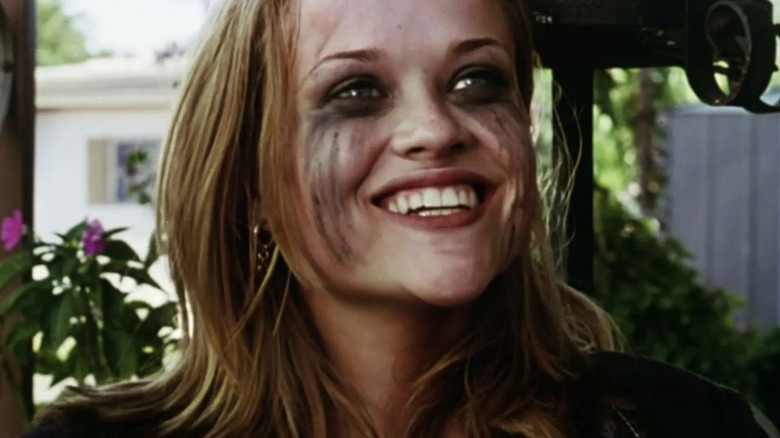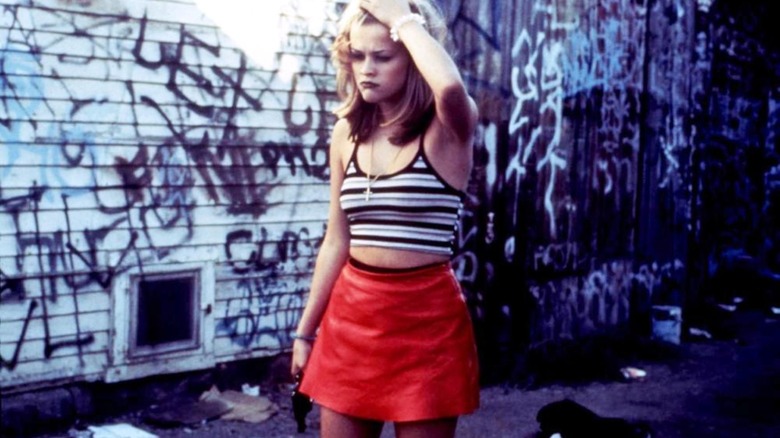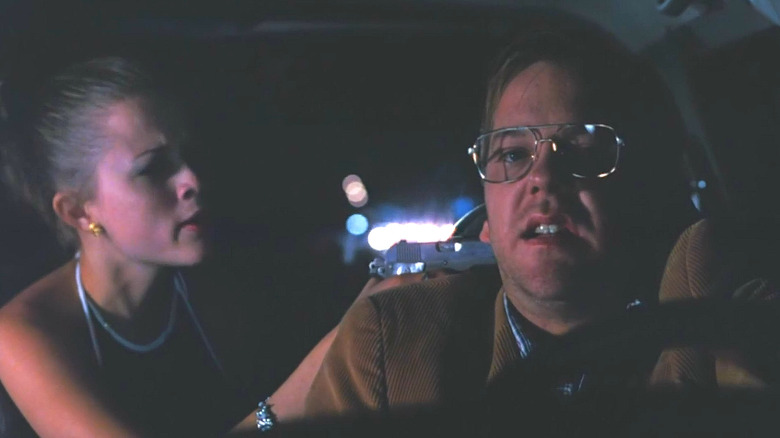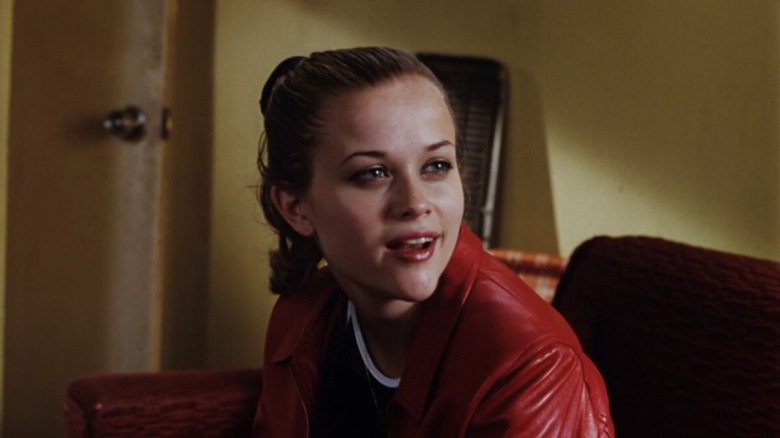The Daily Stream: Freeway Is A Sick Fable For The Sleazy Age
We may receive a commission on purchases made from links.
(Welcome to The Daily Stream, an ongoing series in which the /Film team shares what they've been watching, why it's worth checking out, and where you can stream it.)
The Movie: "Freeway"
Where You Can Stream It: Prime Video/Freevee, The Roku Channel, Tubi, Kanopy, Pluto TV, Plex
The Pitch: You will find few films as aggressively sleazy as Matthew Bright's sordid little 1996 fable "Freeway," a film so confrontational and unsavory, one might be tempted to peg it as a deliberate satire of After School Specials. In fact, it is a gutterpunk send-up of the Little Red Riding Hood story, only Little Red is an illiterate teenage arsonist and sometime sex worker, and the Big Bad Wolf is a serial killing pedophile and necrophiliac. There is no brave lumberjack in this version, and the woods through which Red must traverse are instead the streets of L.A.'s particularly unpleasant neighborhoods. "Freeway" a nasty, exhilarating, picked scab of unpleasantness, ready to be enjoyed. It is gloriously bent morality fable from a seemingly more innocent age; an antidote to mainstream pabulum with easy-to-swallow, blandly axiomatic messaging.
And yet, it is still a distinctly moral film. It also features Reese Witherspoon's best performance to date. And of all the heavies Kiefer Sutherland has played in his career, his role is "Freeway" is one of the most horrific.
Why it's essential viewing
In "Freeway," Witherspoon plays Vanessa Lutz, a high school student still learning to read. Her mother is a twitchy, abusive sex worker played by Amanda Plummer, and her stepdad (Michael T. Weiss) is sexually abusing her. The only positive influence in her life is her boyfriend Chopper (Bokeem Woodbine), who won't live very long into the movie. When her mom and stepdad are arrested, she takes to the road, basket in hand, to find her grandmother a few cities over. When her car breaks down on the freeway, she is picked up by the seemingly kind school counselor Bob (Sutherland), who calmly talks to her, gets her to open up, offers kindly advice, a meal, and understanding she's never encountered before.
It won't be long before Bob — looking every bit like L.A.'s notorious Jeffrey Dahmer, complete with rounded glasses and an awkward haircut — reveals himself to be a murdering pervert who wants to threaten, hurt, molest and murder Vanessa, then molest her again. The scene where Bob moves from being a therapist to an attacker — one who complains about the plague of "garbage people" in the world — is a character transition worthy of Hitchcock. Bob is so transparently evil, you won't feel so bad when Vanessa leaves a large, gun-produced hole in the back of his neck. But worry not — or perhaps worry — because Bob is not out of the film yet.
The rest of the fable will see Vanessa in prison (shades of classic exploitation cinema), while a pair of cops (Wolfgang Bodison, Dan Hedaya) investigate potentially shady things that Bob may be up to (yes, there is a stash of very incriminating photographs in his possession). Brooke Shields plays Bob's wife as the ultimate Karen, long before the term existed.
Little Red Riding Hood
The classical interpretation of the Little Red Riding Hood story — its origins found in 17th century European folklore — is that of a cautionary tale for young women. Wearing red will attract "big bad wolves," that is: sexual aggressors, who will claim to be gentlemanly companions, but who will tear your family apart in order to savage you. In the modern day, equipped with Freudianism, the tale becomes rather explicitly sexual, with the red of the protagonist's coat representing menstruation. One can handily interpret the story as the ultimate representation of a sex negativity: Red must retain her sexual "innocence," and is presented as a "temptation" for the wolfish men of the world. Catherine Orenstein, in her 2002 book "Little Red Riding Hood Uncloaked: Sex, Morality, and the Evolution of a Fairy Tale," the author argues that the fairy tale is a direct analogue for sexual assault.
Matthew Bright's rendition of Little Red Riding Hood gives us a Red that is violent, has sexual agency, and was raised in squalor, but who knows evil when she sees it. Bright sees Red as a young woman that the world is constantly trying to victimize — an impoverished, uneducated sex worker — fighting back against a system that is trying to dispose of her. Wolves, in Bright's estimation, are the seemingly trusted, well-to-do authority figures who have the greatest number of skeletons in their closet. "Freeway" is a feminist movie, a comment on class, and a damnation of white male privilege. Innocence is not a beatific quality assumed by young women to "inspire" and/or tantalize men. It's a refusal to let those men take advantage of you. It's a recognition of evil, even when it comes bearing expensive clothes, advanced degrees, and favor in the courts.
Mathew Bright
Matthew Bright may be familiar to fans of Richard Elfman's bizarro 1980 cult musical "Forbidden Zone," which he co-wrote and wherein he played the wimpy Squeezit Henderson and his trans sister René, both under the pseudonym Toshiro Boloney. Bright would also go on to write Elfman's films "Shrunken Heads" and "Modern Vampires," and would work with Danny Elfman on "Freeway." In 1999, Bright would make a spiritual sequel to "Freeway" called "Freeway II: Confessions of a Trickbaby," which was an equally depraved rendition of the Hansel & Gretel story with Natasha Lyonne and María Celedonio as the lost orphans, rocks of cocaine as the breadcrumbs, and Vincent Gallo as Sister Gomez, the evil witch. It's good, but doesn't have the same audacity as the original.
Bright would also direct the rather depraved and striking 2002 biopic "Ted Bundy," wherein the notorious serial killer was depicted as little more than a bundle of horrible appetites. His last film was 2003's "Tiptoes," a misguided and bizarre 150-minute drama about a man (Matthew McConaughey) who struggled with telling his wife (Kate Beckinsale) that his entire family has dwarfism, including his twin brother, played by Gary Oldman. That film was recut without his permission. It was likely this negative experience with "Tiptoes" that kept Bright from making another movie.
But we'll always have "Freeway," which has lost none of its shocking power since 1996. Pull onto the road and enjoy the twisted glee.



